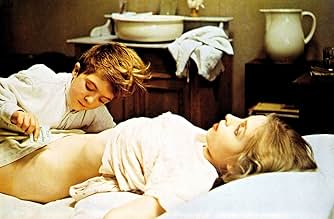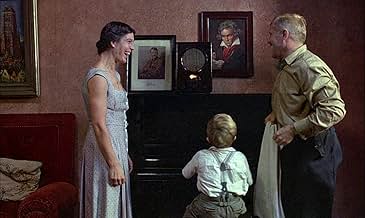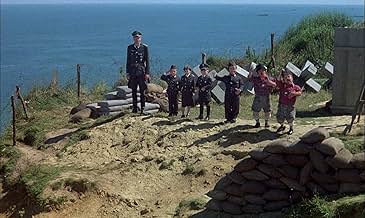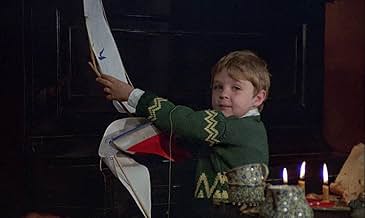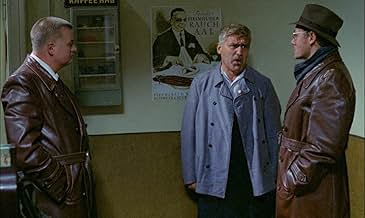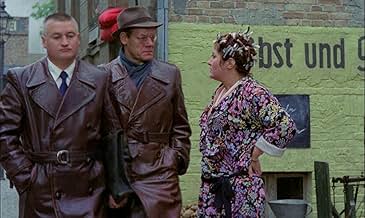En 1924, Oskar Matzerath naît dans la ville libre de Danzig. À l'âge de trois ans, il tombe dans l'escalier et cesse de grandir. En 1939, la Seconde Guerre mondiale éclate.En 1924, Oskar Matzerath naît dans la ville libre de Danzig. À l'âge de trois ans, il tombe dans l'escalier et cesse de grandir. En 1939, la Seconde Guerre mondiale éclate.En 1924, Oskar Matzerath naît dans la ville libre de Danzig. À l'âge de trois ans, il tombe dans l'escalier et cesse de grandir. En 1939, la Seconde Guerre mondiale éclate.
- Réalisation
- Scénario
- Casting principal
- Récompensé par 1 Oscar
- 18 victoires et 6 nominations au total
- Lina Greff
- (as Andréa Ferreol)
- Der Alte Heilandt
- (as Helmuth Brasch)
Avis à la une
The Tin Drum is based on Gunter Grass's highly acclaimed novel which used magic realism to capture the madness of war, and the folly of the people who made it possible. This movie only tackles the first two sections of the novel, leaving out the post-war events. The film won the Academy Award for Best Foreign film in 1980, and the Palm d'Or at Cannes. It was also banned in Oklahoma as "child pornography". Despite moments of brilliance, The Tin Drum left me feeling incomplete and curiously unmoved.
It is a very different kind of film from the others I saw this week, using satire and surrealism to explore people's reactions during the period from 1939 to 1945. It seems to be saying that it is all right to stop growing (that is, participating in the world) as a protest against the cynicism and corruption of the adult world. The setting for the majority of the film, Danzig (now Gdansk) is a major northern port town in Poland. Danzig was a free and independent city until September 1, 1939, when it became the first region taken by Germany at the outset of WWII. After the war, Danzig became a part of Poland again.
The Tin Drum is the story of Oskar Matzerath, a boy who grows up in Eastern Germany before and during World War II. Oskar decides the only way to protest being part of the adult world is by banging on his drum and remaining a child forever. This is his rebuttal of society and his tin drum is his protest against the mentality of his family and neighborhood, or perhaps against all passive people in Nazi Germany at that time. Oskar tries to shock the world out of its inhumanity. His life reflects Germany's struggle to free itself from its own dream of Teutonic superiority and find peace in the national soul.
David Bennent as Oskar gives an outstanding performance, creating a character that is both haunting and frightening. He looks like a little man in a child's body but his eyes are deep and have a very knowing look that seemed to be looking right through me.
Oskar is not a cute little updated version of Peter Pan. Since age three (when he was given his first tin drum), Oskar can scream with such a high pitch that he can shatter any piece of glass. He even controls his scream to the point where he can break windows on the other side of the city, or etch writing into glass. Oskar uses his ability to manipulate and control the adult world, often using vicious and cynical snide comments about the insanity around him. At one point, he disrupts a Nazi rally by changing the beat of his tin drum to the Blue Danube which the band then follows. The ensuing scene where the crowd breaks into a dance and the rain comes down leaving the Nazi soldiers bewildered is one of the best in the film.
I found the scenes where Oskar joins a midget troupe and finds loving companions of his own kind to be very tender and moving. However, the film became morally ambiguous for me when Oskar and his troupe decide to entertain the Nazi soldiers at the front lines. Schlondorff never really makes it clear what his motivations are and Oskar's actions seems to contradict his essentially anarchist protest for most of the film. The Tin Drum also contains some objectionable scenes of childhood sexuality and grotesque depictions of slithering eels being caught using a severed horse head as bait. The result, needless to say, is stomach churning.
I found The Tin Drum to be absorbing and thought provoking yet, despite moments of brilliance, for me it did not add up to a totally satisfying experience.
This is very much a fantasy film. IMDb says it is a war drama, which is true enough, being set in the place and time that it is. But this is less about the war and more about Oskar, which I think makes it a fantasy film. His imagination is incredible, or perhaps more incredible is the idea that none of this is his imagination at all. His ability to alter the world around him is quite interesting.
The idea of a tin drum as a symbol of protest makes sense. It becomes even more interesting when put in the hands of a small child, protesting against life itself. Such an action is unheard of.
Le saviez-vous
- AnecdotesDavid Bennent has a condition which caused him to grow very slowly. When he appeared in this film at age 11, he was 1.14 meters (3 ft. 9' in.) tall. He continued to grow to 1.55 m (5 ft. 1 in), and was still growing well into his thirties.
- GaffesWhile the German soldiers attack the Polish post office, one fires an MG42 machine gun from his shoulder. The German army didn't use that weapon before 1942. It's also not supposed to be fired while standing.
- Citations
Oskar Matzerath: There once was a drummer. His name was Oskar. He lost his poor mama, who had eat to much fish. There was once a credulous people... who believed in Santa Claus. But Santa Claus was really... the gas man! There was once a toy merchant. His name was Sigismund Markus... and he sold tin drums lacquered red and white. There was once a drummer. His name was Oskar. There was once a toy merchant... whose name was Markus... and he took all the toys in the world away with him.
- Versions alternativesAlthough reluctant to do so the BBFC were forced to remove 19 secs from UK cinema and video versions under the Protection of Children Act to remove a scene showing Oskar pressing his face against Maria's pubic region. The cuts were waived in 2003 when it was decided that the scene did not constitute an indecent image.
- ConnexionsFeatured in Pieces of Silver (1989)
Meilleurs choix
Détails
- Date de sortie
- Pays d’origine
- Site officiel
- Langues
- Aussi connu sous le nom de
- El tambor de hojalata
- Lieux de tournage
- Sociétés de production
- Voir plus de crédits d'entreprise sur IMDbPro
Box-office
- Montant brut mondial
- 7 469 $US
- Durée
- 2h 22min(142 min)
- Couleur


